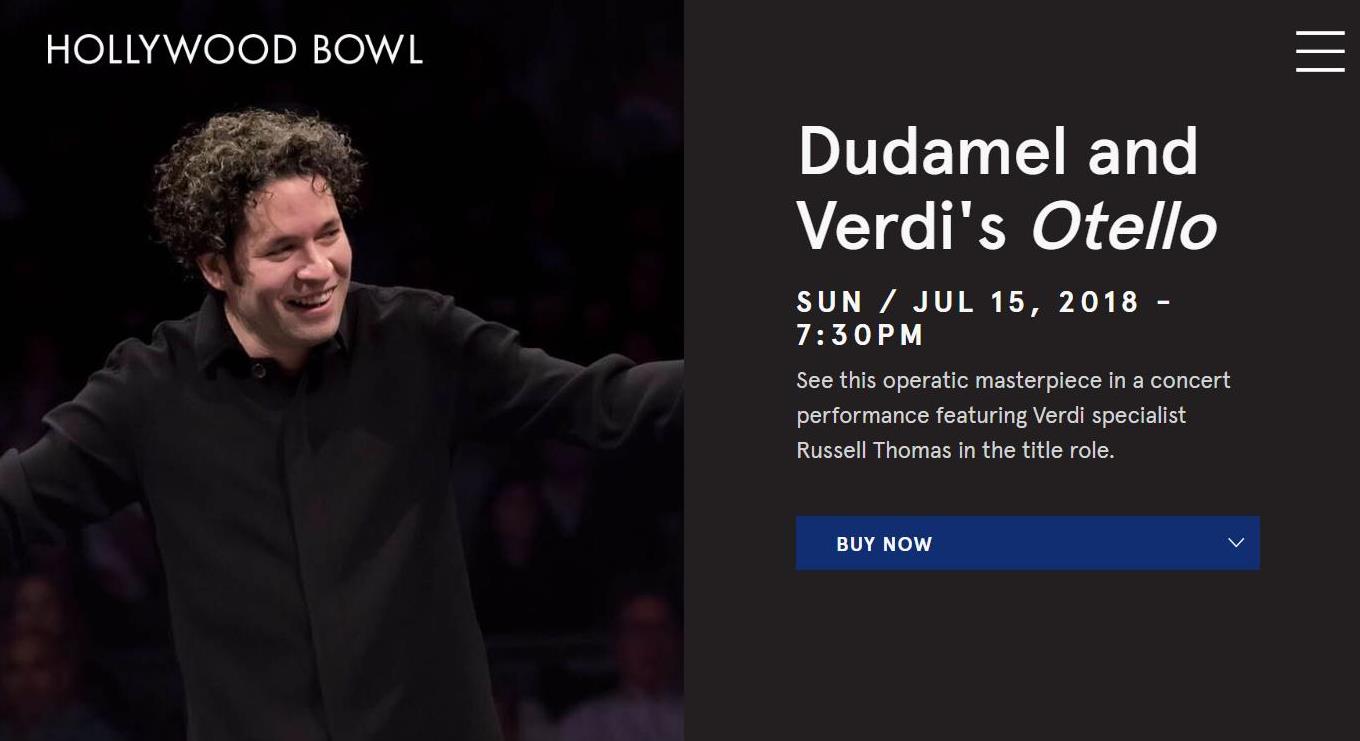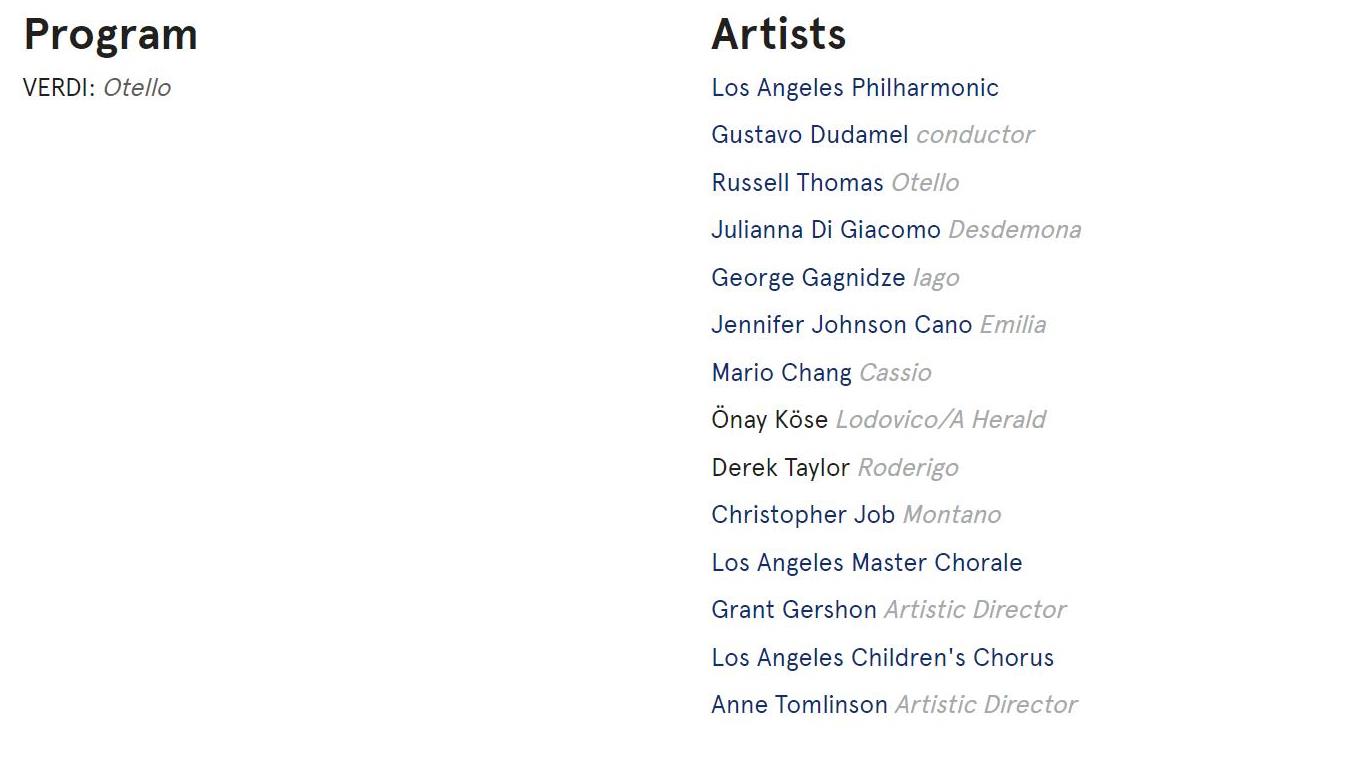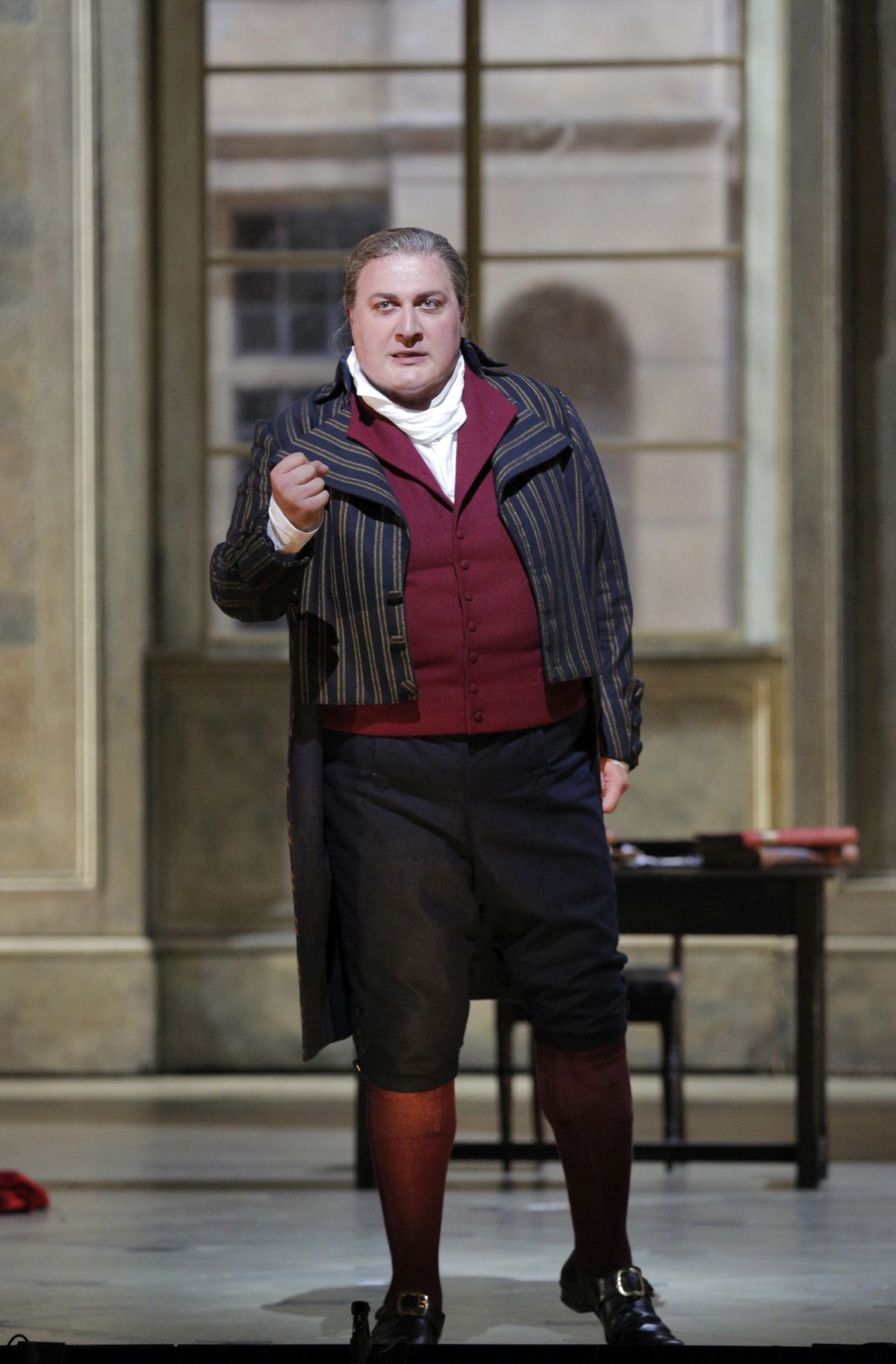Baritone George Gagnidze, Iago at the Bowl
/By Truman C. Wang
7/12/2018
On Sunday, July 15, the starry summer sky of the Hollywood Bowl will serve as the backdrop for Otello and Desdemona’s rapturous Act I love duet. The equally starry cast, led by tenor Russell Thomas as the tragic hero, consumed by jealousy, promise to give vivid life to the Shakespearean drama and to Verdi’s powerful music. With conductor Gustavo Dudamel on the podium, we can fully expect to get seasick from the ferocious opening storm of waves, lightening and rolling ships.
Singing Iago at the Bowl is the Tbilisi-born Georgian baritone George Gagnidze, making his L.A. Philharmonic debut. No stranger to the West Coast, Gagnidze has sung André Chénier and Aida in San Francisco, Rigoletto and Pagliacci at L.A. Opera and Scarpia with the Pacific Symphony.
With the concert a few days away, I talked to Mr. Gagnidze about the music and life as an opera singer:
Growing up, did you always know you wanted to be an opera singer? Were your family musical?
My father was singing in a folklore choir and we were always singing in the family, for example at the dinner table which is a Georgian tradition. So I was always singing growing up, but didn’t know much about opera. I actually thought about studying Jura. Then a friend of my father heard me sing and recommended I should study with a singing teacher. I sang for him and began my singing studies under his guidance.
How do you balance family life and work as a busy traveling singer? Are your kids also musical?
My daughter just started with singing lessons, she is a soprano and likes opera very much. I always try to spend several months a year at home with my family and if they can they join me when travelling.
Who is your favorite composer and why?
Giuseppe Verdi. He wrote so many masterpieces! I consider myself a Verdi voice and for a baritone there are so many incredible Verdi roles, for example Nabucco, Macbeth, Falstaff, Iago, Germont, Luna, Don Carlo in Ernani, Francesco in Masnadieri, Renato… The list is very long!
What are the qualities of a great Verdi baritone? Are they the same as for a verismo baritone?
A “real” Verdi baritone is for me is a singer who has got a wide tessitura, steady low notes, a secure middle voice and good high notes. It should be a round sound with a lot of color and the ability to sing endless legato lines. I think a great verismo baritone should have the same features.
Can you tell us how you prepared the role of Iago, both vocally and mentally? What were the challenges?
I made my role debut as Iago at the Staatsoper Hamburg in 2014 and have subsequently sung it in Athens. It is a late Verdi role which requires a lot of declamato and a big voice which is able to sing with this huge orchestra. It requires a lot of different colors and character, sharp and clear diction. It is certainly the Verdi role which is closest to “verismo”. It is a challenge to perform such a malicious role and I always want to explain myself why all these “bad guys” became so vile. That helps me characterizing them. For me Iago has lost his inner control because of his jealousy for Otello. He is a loser who didn’t reach what he wanted to reach in life and projects his frustrations on Otello and hates him therefore and therefore wants to destroy him.
Rigoletto is probably the single role you are most identified with. How was your 1st Rigoletto different from your 90th? How do you keep the character fresh?
For Rigoletto it is crucial to interpret the text well and to be able to manage your breath very well. You have to be in top form for Rigoletto, otherwise it is impossible to sing that role. I have become even more secure singing the role over the years of course. It has constantly developed these yeara, vocally and also in regards of the interpretation. I’ve sung this role with many great conductors and was directed by many great stage directors who have all helped me to develop it further as a character and musically. For example with Gustavo Dudamel with whom I’ll now be singing Iago in Los Angeles I sang my first Rigoletto at La Scala in a new Gilbert Deflo production which was very important for my carer.
In light of today's #MeToo and politically-correct climate, some argue that the Duke should be killed instead of Gilda. Do you feel opera should be socially relevant, or merely entertaining? To what do you attribute "Rigoletto"s enduring popularity?
Operas were of course written to entertain the audience. But for example Rigoletto is certainly a drama with a social relevance. If Gilda were raised as a free woman and wouldn’t be held captive by Rigoletto, she certainly wouldn’t be so blind in love with Duca and wouldn’t make the decisions she is making. Nowadays there are many modern productions demonstrating the social relevance of the pieces and I find that very interesting. I think Rigoletto is still so popular because the drama is thrilling, the characters are intriguing and the audience can feel and suffer with them, especially with Gilda. And of course the opera contains many of the most popular melodies written by Verdi, and maybe his most breathtaking duet, “Si vendetta”.
How would you compare opera in Europe, Russia and America, in terms of production and audience?
I’m not sure about Russia since I’ve never performed there. In Europe the productions usually are a bit more modern than in the USA. For the audience I don’t see so many differences.
Do you think there is still such a thing as the Italian school of singing, the Russian school, the French school, etc.?
I think the old Italian bel canto school is the most important singing school and the basis for all singing schools, the Russian school, French school, German school etc.
Who is the artist that's your greatest inspiration?
Plácido Domingo for his long and successful career and his artistry.
How do you feel about opera singers who 'cross over' into pop or musicals?
It depends. I think it doesn’t harm reaching out to a new audience and maybe to young people. On the other side as an opera singer singing pop you have to be very careful not to harm your voice.
What advice do you have for young singers just starting out?
Never stop working very hard, especially on the style.
What are your outside interests when not singing? Do you teach?
I’m frequently giving masterclasses and find it very interesting to teach. I’m constantly reading books about singing technique and find it fascinating to give my knowledge and experience to young singers and see how they apply what I’m telling them.
What's next after “Otello” in Los Angeles?
Immediately after this Otello in Los Angeles I will be heading to New York for the gala concert “A Georgian Night” with my great colleagues soprano Nino Machaidze and tenor Shalva Mukeria, vocalist Nutsa Shanshiashvili, and pianists Elisso Bolkvadze and Bradley Moore. We will be singing many beautiful arias and I it will be a beautiful concert I’m looking much forward to.
Truman C. Wang is Editor-in-Chief of Classical Voice, whose articles have appeared in the San Gabriel Valley Tribune, the Pasadena Star-News, other Southern California publications, as well as the Hawaiian Chinese Daily.







